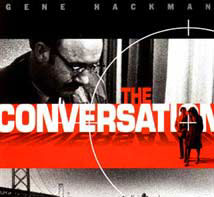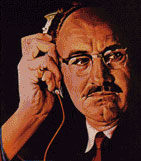
| The
Author and the Film Editor: Ondaatje interviews Murch
by Mike Shen |
|
The
most interesting thing about Walter Murch is not his resume as a
film editor and sound designer -- which is saying something, since
his credits include classics like The Godfather trilogy,
Apocalypse Now, and The Conversation. No, the most
interesting thing about Murch is that he works standing up at his
editing machine, like Virginia Woolf standing at her desk. "It's
very similar to gunslinging," says Murch. "That's the When Michael Ondaatje's novel The English Patient was adapted for the screen, he had the rare opportunity to watch a master film editor at work. As he writes in his fine new book of interviews, The Conversations: Walter Murch and the Art of Editing Film, he felt not only a fascination, but a kinship: "When I watched Walter Murch at work… I knew that this was the stage of filmmaking that was closest to the art of writing." Ondaatje notes that, like prose, editing is "a long intimacy", comprising months spent alone with one's material, gradually discovering the work in its final form. But these labors remain largely unknown to the moviegoing public, a longstanding neglect that Ondaatje hoped to rectify. As Murch points out, this oversight was once pervasive within the film industry itself.
Ondaatje: And the man is the hunter-gatherer, coming back with stuff for her to cook! Murch: The men could bring it home, but they didn't quite know what to do with it. The
interviews in The Conversations took place from 2000-2001,
during which Murch edited various projects, including Apocalypse
Now Redux, the Harrison Ford thriller K19: The Widowmaker,
and finally, the restoration of a short film by Thomas Edison, believed
to be the first motion picture with sync sound. The squeezing of
this last curiosity into an otherwise big-budget schedule seems
emblematic of the Walter Murch Ondaatje (and perhaps his book editor at Knopf) keeps The Conversations moving briskly. Forays into theory are balanced with anecdotes and specific examples of Murch's editing, in particular his groundbreaking work in sound: when a scene in Apocalypse Now called for the sound of crickets in a field, Murch recorded crickets individually, at close range, then overlapped the tracks a thousand times, achieving, in his words, a "hallucinatory clarity". The book offers also some less eccentric, nuts-and-bolts advice on editing. Use music, Murch says, "as a collector and channeler of previously created emotion, rather than the device that creates the emotion… Most movies use music the way athletes use steroids." On where to cut: try cutting when the actors blink, since blinking often signifies the completion of a thought. Murch: In The Talented Mr. Ripley, for example, Ripley is sitting on a beach and looks out to sea. There's a shot of the sea. How long do you hold it? You hold it for as long as the thoughts you imagine Ripley is thinking can be held while you are looking at that shot." Murch muses that cinema, only a century old, is like European music of the tenth century, before the invention of musical notation. "When modern musical notation was invented, in the eleventh century, it opened up the underlying mathematics of music, and made that mathematics emotionally accessible. You could easily manipulate the musical structure on parchment and it would produce startlingly sophisticated emotional effects when it was played." Could a system of film notation be invented, he wonders? Imagine a filmmaker, like a musician reading sheet music, glancing at a page and comprehending, in an instant, not only the dialogue, but the lighting, rhythm, and tone of a scene. The filmmaker of the future could write a piece of sheet music, feed it into a machine, and receive back a finished film. Though he finds the idea intriguing, it's also clear that Murch is no solipsist. "Digital technology allows, more than ever, a single vision to work itself out, and that carries a particular danger because you need fewer collaborators." The editor may touch the picture last, but he or she inherits the decisions of dozens of people -- the director, the writer, the cinematographer, the actors -- now to be knit together. Even "mistakes" may find a place in the final cut; for example, the famous last line of The Conversation, the first film Murch edited, was delivered accidentally during additional dialogue recording. "How do you cope with the authority?" Murch asks Ondaatje, during a discussion of the differences between filmmaking and writing. "I'm always trying to break up the authority of the film to allow other voices to be heard -- chance voices."
--Mike Shen Discuss this article on the nextPix FORUM by going to its discussion thread: [click here] To Buy the book on amazon.com [click here] |

| |
 |
Euro Screen Writers Articles on Euro film, research, plus a great cache of interviews with such directors as Godard, Besson, Agnieszka Holland, Peter Greenway, and Fritz Lang. |
 |
Done Deal: A current list of the latest industry script sales. |
 |
UK's Film Unlimited Truly unlimited, one of the best film sites going. Plenty of news, reviews, special reports, features, and PREVIEWS. |
 |
Screen Writer's Utopia! What are they, who wrote them, who's doing them, and what you can expect. |
 Review
of "The Conversations: Walter Murch and the Art of Editing
Film" -- by Michael Ondaatje
Review
of "The Conversations: Walter Murch and the Art of Editing
Film" -- by Michael Ondaatje reason
I stand when I edit -- I'm fully engaged in my body." It's an inspired
notion -- the physical answer to what is, in many ways, the most
cerebral element of filmmaking.
reason
I stand when I edit -- I'm fully engaged in my body." It's an inspired
notion -- the physical answer to what is, in many ways, the most
cerebral element of filmmaking.  Murch:
Many of the editors of early films -- back in the silent days --
were women. It was a woman's craft, seen as something like sewing.
You knitted the pieces of film together…
Murch:
Many of the editors of early films -- back in the silent days --
were women. It was a woman's craft, seen as something like sewing.
You knitted the pieces of film together…
 who
emerges in these pages: an intellectual engaged not merely in the
insular mechanics of film, but in the disciplines of history, music,
literature, and science, all of which pollinate his work. When asked
to identify the fathers of film, Murch names, among others, Flaubert
and Beethoven, whose experiments in realism and dynamic musical
form would spawn the language of narrative cinema. And in his spare
time, Murch has been translating the prose of Italian writer Curzio
Malaparte into poetry, finding correlation between where to break
a line of verse and where to end a shot.
who
emerges in these pages: an intellectual engaged not merely in the
insular mechanics of film, but in the disciplines of history, music,
literature, and science, all of which pollinate his work. When asked
to identify the fathers of film, Murch names, among others, Flaubert
and Beethoven, whose experiments in realism and dynamic musical
form would spawn the language of narrative cinema. And in his spare
time, Murch has been translating the prose of Italian writer Curzio
Malaparte into poetry, finding correlation between where to break
a line of verse and where to end a shot.
